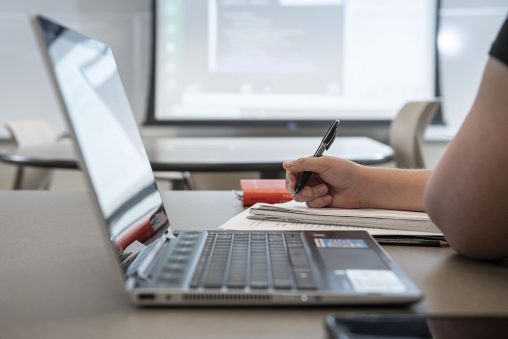
The Collaborative Online International Learning (COIL) program will include a virtual global health course, a drug and behavior course and an international business and marketing course.
Virtual student exchange courses at Wright State University are being launched with Poland, Tanzania and Kenya to make international education more accessible.
They are part of a new program called Collaborative Online International Learning (COIL) that is supported by grants from Wright State’s Students First Fund. The fund was created by the Wright State University Foundation Board of Trustees to support innovative ideas that enhance the student experience.
Under the direction of the University Center for International Education (UCIE), COIL connects students and professors in different countries virtually for collaborative projects and discussions as part of their coursework by linking two or more classrooms, their teachers and their students in a shared intercultural environment.
The program will include a virtual global health course exchange with Muhimbili University of Health and Allied Health Science in Tanzania under the direction of Rosemary Eustace, Ph.D., professor of nursing; a drug and behavior course exchange with the University of Gdańsk, Poland, under the direction of Michal Kraszpulski, Ph.D., lecturer in neuroscience, cell biology and physiology and psychology; and an international business and marketing course exchange with Africa Nazarene University in Nairobi, Kenya, under the direction of Wakiuru Wamwara, Ph.D., associate professor of marketing.
“Expanding our offerings through COIL will help us reach more nontraditional students, increase study locations with our institutional partners overseas and expand international education in more diverse academic areas such as science, technology, engineering and math,” said Michelle Streeter-Ferrari, director of UCIE.
Wamwara said she is very excited about the opportunity the virtual exchanges present for her international business and international marketing students.
“Working on projects and interacting with students and faculty from a different culture like Kenya will go a long way in preparing our students to work in a globally diverse world,” she said. “Most of our students may never have an opportunity to travel to Africa or to work on a transnational team, therefore COIL will bridge this gap by offering meaningful exchanges.”
Eustace said global health learning helps students gain a better understanding of the needs and health of diverse communities from a holistic lens.
“Using a cultural approach, students will be empowered to collaborate and cooperate online as they learn about different global health topics,” she said.
Belinda Balandya, COIL course coordinator for MUHAS in Tanzania, said the course will give students a broader understanding of global health challenges without having to travel internationally.
“They will learn about different cultures and be able to experience internationalization while at our home institution,” Balandya said “MUHAS students will also be able to make friends with students from other institutions, which will have positive influence on their studies.”

 Wright State alum Lindsay Aitchison fulfills childhood space-agency dream
Wright State alum Lindsay Aitchison fulfills childhood space-agency dream  Wright State business professor, alumnus honored by regional technology organizations
Wright State business professor, alumnus honored by regional technology organizations  Wright State University Foundation awards 11 Students First Fund projects
Wright State University Foundation awards 11 Students First Fund projects  Gov. DeWine reappoints Board Treasurer Beth Ferris and names student Ella Vaught to Wright State Board of Trustees
Gov. DeWine reappoints Board Treasurer Beth Ferris and names student Ella Vaught to Wright State Board of Trustees  Joe Gruenberg’s 40-Year support for Wright State celebrated with Honorary Alumnus Award
Joe Gruenberg’s 40-Year support for Wright State celebrated with Honorary Alumnus Award 